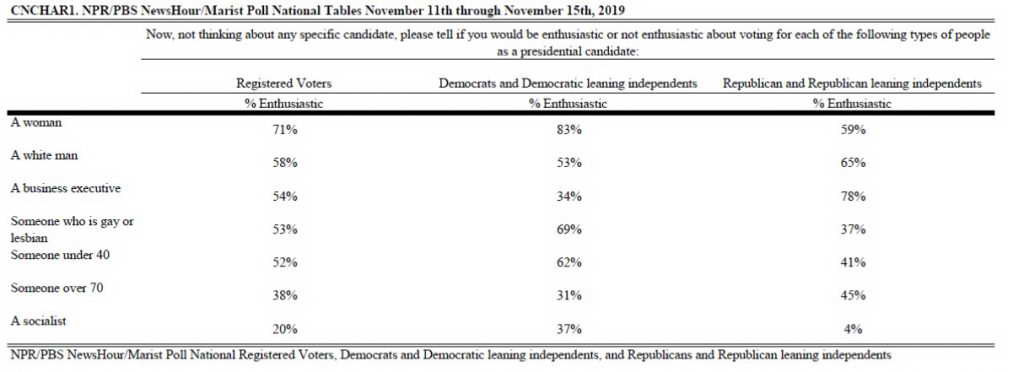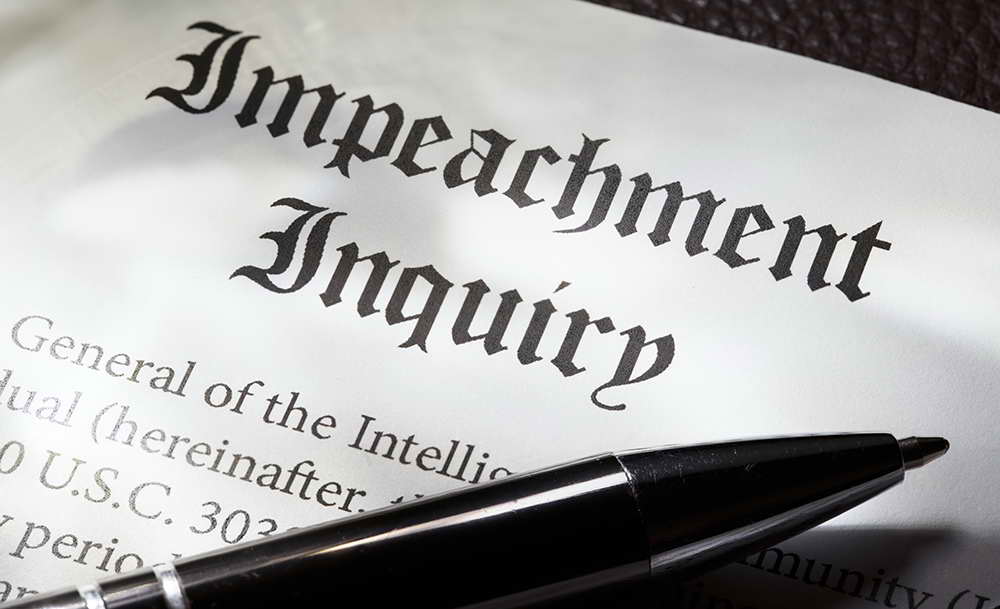November 20, 2019
Impeachment & the 2020 Election, Nov 2019
NPR/PBS NewsHour/Marist National Poll
Many Americans are following the developments of the House of Representatives’ impeachment inquiry into President Donald Trump, and most say the evidence presented is influencing their opinions about impeachment one way or the other. While half of Americans approve of the impeachment inquiry, they divide about whether or not the president should be impeached and removed from office. The impeachment debate draws loyalty from the parties.
88% of Americans say the testimony and evidence presented during the impeachment inquiry has altered their view about impeachment. But, what exactly do they mean by that? Included here are 47% who say the information has made them more likely to support impeachment and 41% who say it has made them less likely to support impeachment. Five percent think it has made no difference. Opinions fall squarely along party lines, suggesting the change in opinion has been in intensity rather than direction. Independents divide. 45% say the evidence has made them more likely to favor impeachment while 45% report it has made them less likely to do so.
“So far, the public reaction from the first round of testimony is breaking along party lines and is more about reinforcement than persuasion,” says Dr. Lee M. Miringoff, Director of The Marist Institute for Public Opinion. “In a super charged atmosphere, there haven’t been super quick changes in public opinion.”
In fact, nearly two in three Americans (65%) say there really aren’t any developments in the impeachment inquiry that would sway their position. Three in ten residents nationally (30%) do say that additional information could change their minds. The latter includes 39% of independents, 25% of Democrats, and 24% of Republicans who say new material could alter their position.
More than six in ten Americans (63%), comparable with 61% last month, say they are following the news about the impeachment inquiry very or fairly closely. 37%, similar to 39% last time, say they are not following it very closely or at all.
Half of Americans (50%), compared with 52% last month, approve of the impeachment inquiry brought forth by the House of Representatives. 43%, identical to last time, disapprove of the probe. 32% of Americans who approve of the impeachment inquiry strongly do so. 30% of those who disapprove are strongly of that opinion. Independents split on the impeachment inquiry. 46% approve, and 46% disapprove.
Americans divide, though, about the motivation behind the House of Representatives’ impeachment inquiry. 49% consider it to be a serious matter, and 47% think it is just politics. In October, a majority (51%) thought the impeachment inquiry was a serious matter, and 46% said it was just politics.
There is a stark divide among Americans on whether or not President Trump should be impeached and removed from office. 45% of residents nationally support impeachment and the removal of Trump from office. 44% of Americans oppose or are unsure about impeachment and oppose or are unsure about removing Trump from office.
Impeachment is a complex issue. When looking at Americans’ attitudes about whether or not to just impeach President Trump, Americans divide, 47% favor impeachment, and 46% do not, relatively unchanged from last month.
Central to the impeachment inquiry is the whistleblower who filed a complaint about the contents of President Trump’s phone call with the President of Ukraine. A majority of Americans (56%) assert the identity of the whistleblower should be protected. 39% believe the whistleblower’s identity should be revealed. This is little changed from the October poll.
Seven in ten Americans (70%) say it is unacceptable for a president to ask a foreign leader to help investigate a potential political opponent compared with 68% in October. 22% think it is acceptable. 26% previously said the same.
“Strictly on the merits of what has been presented, people think it is wrong for a president to interject a foreign leader into the United States’ electoral politics,” says Dr. Lee M. Miringoff, Director of The Marist College Institute for Public Opinion. “The disagreement is on whether or not it is a big deal which warrants impeachment.”
When it comes to the impact the impeachment inquiry may have on the 2020 congressional elections, 29% of voters nationally say they are less likely to vote for their representative if they vote to impeach President Trump. 19% report it will make them more likely to do so. This is little changed from October. 50% think it will make no difference to their vote, an increase from 43%.
The Democrats have a five-point edge on the generic congressional ballot question. 46% of registered voters say they are more likely to support the Democrat in their district in 2020 while 41% think they are more likely to support the Republican. Two percent say they will cast their ballot for someone else, and 11% are undecided. In October, the Democratic candidate (43%) was +3 over the Republican (40%). Two percent said they would support someone else. 15% were undecided.
Turning to the 2020 Democratic primary contest, close to seven in ten Democrats and Democratic-leaning independents nationally (69%) are satisfied with the field of candidates seeking the Presidency. Nearly one in four (23%) are not satisfied, and 8% are unsure.
More Democrats and Democratic-leaning independents have decided which candidate they will support for their party’s nomination, 24% up from 17% in July. However, most (75% down from 82%) have yet to make up their mind.
“Although people haven’t made up their mind, Democrats are satisfied with the options they have in candidates for the Democratic nomination,” says Dr. Lee M. Miringoff, Director of The Marist College Institute for Public Opinion. “This suggests there is more interest in learning about the candidates who are on the track rather than expanding the field with new ones.”
Registered voters nationally are most enthusiastic about voting for a presidential candidate who is a woman (71%), followed by a white man (58%), a business executive (54%), a gay or lesbian candidate (53%), and a candidate under the age of 40 (52%). They are the least enthusiastic about voting for a candidate who is a socialist (20%) or a candidate who is over the age of 70 (38%).
Democrats and Democratic-leaning independents are most enthusiastic about having a female as a presidential candidate, followed by someone who is gay or lesbian, and someone who is under the age of 40. Among Republicans and Republican-leaning independents, they are most enthusiastic about having a business executive, followed by a white man, and a woman as a presidential candidate. Of note, twice as many Democrats are excited about a candidate under the age of 40 than about one who is over the age of 70.

A majority of registered voters nationally (52%) report they will definitely vote against President Trump in the general election. 39% say they will definitely vote for him. Nine percent are unsure. When this question was last reported in October, identical proportions of voters held these opinions.
President Trump approaches the 2020 election year amid the impeachment inquiry and an approval rating that remains upside down. 41% of adults approve of the job Trump is doing as president, including 29% who are strongly of this opinion. 51% disapprove of his job performance. This includes 40% who strongly feel this way. President Trump’s approval rating is little changed from the 42% score he received in October. At that time, 52% disapproved of how the president was doing his job.
A majority of Americans (54%), similar to 56% in September, disapprove of how President Trump is handling foreign policy. 39% approve, and 7% are unsure. When it comes to Syria, the president’s approval rating is also underwater. 52% disapprove of how he is handling the situation, and 33% approve. 16% are unsure.
Complete November 20, 2019 NPR/PBS NewsHour/Marist Poll Release of the United States

